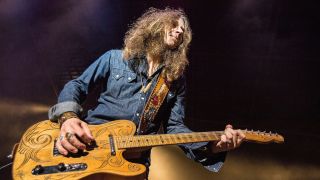Southern rockers Blackberry Smoke have seen their stock rise significantly over the past few years, and as befits any group on the ascent, they recently paid their first visit to the NAMM (National Association of Music Merchants) Show in Anaheim, California. Singer-guitarist Charlie Starr remembers his maiden NAMM voyage as “overwhelming,” but not exactly for all the right reasons.
“After walking around for an hour, I said, ‘I can’t take another guitar solo!’” he says with a laugh. “At first it was kind of cool, but everywhere I turned, it was just shredding and more shredding, each guy trying to play faster than the other guy. It was like one giant guitar clinic. That might do it for some people, but I need the rest of the deal – a song. Great guitar playing by itself is kind of a dead end.”
In compiling his list of “essential guitar albums,” Starr points out that songs reign supreme in his choices. “These records feature some of my favourite guitarists, but I don’t know if I’d feel that way if they didn’t write exceptional material,” he says. “A great guitar player has a job, and that’s to serve the song. That’s what’s great about the first four Van Halen records: Eddie wrote these amazing songs, and then he went crazy on the guitar. But the songs came first. He always, always served the material.”
In Blackberry Smoke, Starr shares guitar duties with Paul Jackson. The two come from different places stylistically – Starr is more of a rock-and-blues traditionalist, whereas Jackson tends to favour metal. Starr recalls that the band’s early van touring days resulted in some interesting – and mutually beneficial – CD player wars.
“We kind of went back and forth: ‘Check this out, man.’ ‘Oh yeah? Well, listen to this.’ Paul would put on things like obscure Iron Maiden records. I knew a little bit of Maiden, but I didn’t have their records in my collection, so it was great that he exposed me to that kind of thing. I grew to appreciate it.”
For his part, Starr turned Jackson on to Delta blues and bluegrass, but also Little Feat and older Pink Floyd. At first, Jackson put his foot down when Starr tried to interest him in the Grateful Dead (“He hated the Dead. I mean, hated them!”), but after hearing Starr’s mix tape of deep Dead cuts, he started to come around. “Paul only knew things like Truckin’ and Uncle John’s Band – the stuff that was on the radio,” Starr notes. “I got him to listen to live stuff and songs that he never would have heard before. Finally, he said, ‘Wow, what have I been missing?’
“That’s what you’ve got to do when you’re in a band – bring your tastes together and make it something new. And a lot of it starts with what’s in your record collection.”
Below, Starr runs down his choices for five essential guitar records.
Aerosmith – Rocks (1975)
“I was 11 years old and was riding my bike with my best friend, and we came across a flipped-over truck that was stuck in the mud. Whoever owned the vehicle must have just left it or something. I looked inside and saw these two cassettes. One of them was Aerosmith’s Rocks. I didn’t know who Aerosmith was, so I took the cassette home and gave it a listen. Boom – I’d never heard anything like it. All at once, I was like, ‘What is this? This is incredible!’
“It was so dark and heavy, strange and sexy sounding. This singular experience made me want to play the electric guitar. I’d probably heard Dream On on the radio, but I didn’t put that song together with Aerosmith. So this was really my introduction to the band. I just couldn’t believe how cool the guitars sounded. The riffs, the solos, the way the two guitars played off each other – the whole thing blew me away.
“’Fierce’ is a good way of describing the guitar playing on this album. And the tones, too – the sound was brutal and angry. There’s nothing soft or gentle about what Joe Perry and Brad Whitford were doing here. They went for the throat. It’s funny: Up till then, I’d been playing bluegrass and hillbilly music, but because of Aerosmith I started going in a more rock direction.”
The Rolling Stones - Exile On Main St. (1972)
“I was 16 years old and was working at a record store. I already had Sticky Fingers and Hot Rocks, so I was a Stones fan. One day an older girl who also worked at the store put on Exile, and as it went from one song to the next I was just mesmerised. It seemed to wholly encompass everything I loved about rock ‘n’ roll music.
“But there was certainly a lot more than just rock on it. You had blues, country, gospel, and on a song like Rip This Joint you’ve got old-school boogie rock ‘n’ roll. It was a complete musical experience meant to be listened to from beginning to end. I still listen to it that way. I never put on a song or two and then stop.
“There’s a lot of beautiful guitar playing, and it kind of defines the Stones in that era – it’s full of boozy swagger. They didn’t turn Mick Taylor loose like they did on Sticky Fingers – he was really ripping on that one. But what I like about it is how it’s a great example of guitarists serving the song. They played exactly what needed to be played and nothing more, both guys staying I the pocket with Charlie Watts.”
Allman Brothers Band - At Fillmore East (1971)
“The premier Southern rock guitar album. Where I come from, this is the Bible for guitarists. From the first note to the last lick, it’s a full-blown lesson on how to play beautiful, tasteful guitar and how to communicate with other musicians. Absolute perfection.
“I have a vinyl copy, and I love how you hear somebody in the crowd call, ‘Whipping Post!’ Duane Allman says back to him, ‘You got it.’ And then they launch into the song. It’s such a cool moment. I got a CD copy later on, and that was chopped off. Bummer.
“I was musically nerdy by the time I got the record, so I sat down with it and I studied. I had to know what Duane was playing and what Dickie Betts was doing. I had to know, at all times. I played this thing to death and never got tired of it. From listening to the Stones, I learned open tunings, so that helped me to discern, ‘OK, here Duane is playing slide in open E,’ and so on. It was such a joy to play along to this record.
“It’s the greatest live rock‘n’roll record that you can find. And that’s exactly what it is: It’s live. There are no fixes, no sweetening – it’s the band playing together, totally in the moment. This is as ‘you are there’ as it gets.”
Lynyrd Skynyrd - Second Helping (1974)
“This is a perfect example of what the Allman Brothers did and then some. Gary Rossington, Ed King and Allen Collins were very distinctive guitarists, and they all played very different parts. Magically, they never stepped on one another’s toes, which is pretty remarkable.
“It’s my favourite Skynyrd album, by far. Sonically, it’s perfect – it sounds like Muscle Shoals. There’s such a great vibe to it. It’s funky and greasy and dirty; it’s under-produced, if anything. And the songs! Oh, to be a band with that many fucking incredible songs.
“At first, I gravitated toward Rossington because I thought he looked so damn cool. Plus, he played a Les Paul, and I wanted one of those guitars, so there you go. But then I started leaning toward King – the guy who wasn’t from the South, funnily enough – because his choice of notes and his feel got to me. He seemed quirkier than other players. Everything he did stuck out. But no matter who you favour, there’s so much great guitar playing on this album, and so many amazing songs. It’s all good.”
AC/DC – Powerage (1978)
“Nobody mentions this album, but it’s my favourite. I love Highway to Hell and Back in Black as much as the next guy – both albums are perfect – but I feel as if Powerage is more of a rough, raw rock‘n’roll record. It was more of a family affair behind this album – it was produced by Angus and Malcolm Young’s brother, George, and Harry Vanda. This is before the band started working with Mutt Lange, who kind of made everything bigger and shinier.
“You get a sense of the great big boogie band AC/DC were before they started with Mutt. They’re more of the band you might seen killin’ it in a club versus the enormous arena band they became. In that way, they’re not so far removed from Lynyrd Skynyrd, although they’re a dirtier, nastier Lynyrd Skynyrd.
“The guitars are almost unspeakably good. These guys were hitting on all cylinders. You know when it’s Angus and when it’s Malcolm, no two ways about it. Everything they do is just balls out. Malcolm lays down this massive wall of sound for Angus to solo over and play all of his attitude-filled licks. Two guys who do different things but speak the same language. Nobody sounds like them, and nobody should try.”


